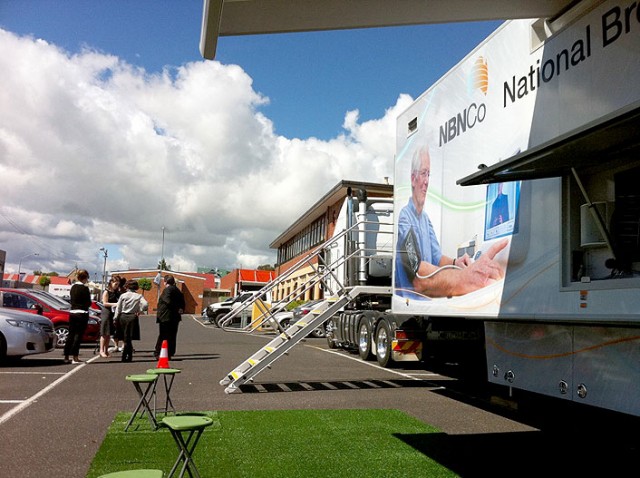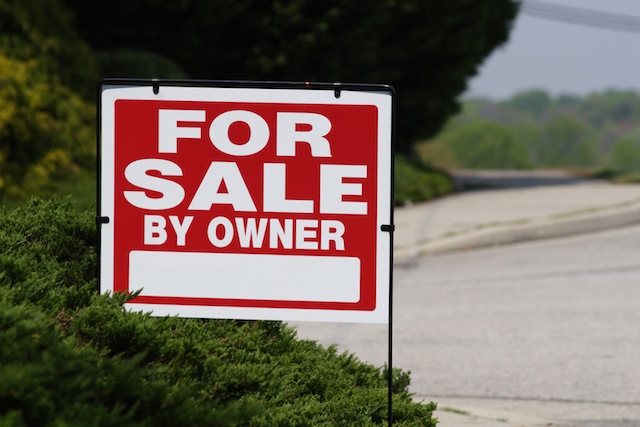In Technology Spectator today I write about how Australia is risking repeating the mistakes the colonies made with railway gauges on much more grand scale with telecommunications technologies.
With talk of re scoping the National Broadband Network project, despite being four years into a ten year undertaking, it’s important to understand just how foolish this would be an what a mess it will create.
To illustrate this, I’ve gone for a walk along a Sydney street on the Lower North Shore. This suburb is less than 5km from the city’s central business district.
The pillar at the end of the street
At the end of this typical suburban street is a little gray, well guarded but battered pillar. This box is important as it contains the connections to the local telephone network and its replacement will house the distribution equipment for a fibre network regardless of what type is installed.
Interestingly, just the presence of the pillar and the associated manholes nearby indicates there is already fibre in the neighbourhood, one aspect in the NBN debate that’s overlooked is that optical fibre is standard for telco backhaul and distribution networks.
The only reason fibre hasn’t already been rolled out to homes and businesses is the sunk cost of the copper cables. When it’s necessary to replace an entire copper system as in New York after Hurricane Sandy or in South Brisbane after the local phone exchange was sold, then fibre is what telcos will install as its cheaper to maintain.
Plain old telephone lines
Walking down the street we find the first example are those who are going to be stuck with the old copper network under a fibre to the node solution.

What’s notable about that pole is its shocking state – in itself it illustrates just how Australia’s telecommunications networks have been allowed to run down with the underinvestment of the last twenty years.
There’s a very chance the householders connected to those phone lines won’t be able to sustain a reliable ADSL or FTTN connection because of the state of the wires.
Remember, this pole isn’t in some remote part of rural Australia, should you be brave enough to climb it you’d have a wonderful view of the Sydney Harbour Bridge, North Sydney and the city. Its state illustrates that underinvestment is just as much a problem in the suburbs as it is in the bush.
Using the Pay-TV network
One the alternatives being touted is using the Pay TV network cables – know as Hybre Fiber Coaxial, or HFC – to carry the broadband signal.

Here’s an example of the Foxtel installations and the poor work quality stands out immediately. The connection on the left is notable for its rain catching properties which doesn’t bode well for what’s happening to the coax cables in the duct lurking beneath the footpath.
As an aside, the sort of poor quality workmanship found in the cable rollout is another risk to the NBN as it appears NBNCo is repeating Foxtel’s mistake of screwing the installation contractors into the ground on their rates. The result is really low quality work which won’t stand the test of time.
Making HFC even less useful is the fact that most Australian properties can’t connect to it.
In one of the best of examples of the drooling incompetence of Australia’s political ‘elite’, the 1990s Keating government managed to engineer a situation where the two cable companies rolled out their networks to the same places – 30% of the country got two networks while the rest received nothing.
The real problem though with the HFC network is that most Australians who can get it haven’t bothered – take up rates in the areas cable is available struggle to hit 50%. So an Abbot government would actually have to pay to connect households to a service they’ve never wanted.
Probably the cruellest part of all with the HFC proposal is the coax network itself is approaching the end of its life and most will be replaced with fibre within a decade. So we’re not saving a cent, just kicking costs down the road.
Apartment living
Even if you lived in that thirty percent of the country that did get pay-TV cable along their street, you were out of luck if you lived in an apartment or townhouse as few strata committees were interested in paying Foxtel install cables and Optus was never interested in MDUs – Multi Dwelling Units in telco-speak.

A little way down the street from the houses photographed above are a group of town houses. Under the current NBN plans, this complex will get fibre. Under the coalition’s it will be stuck with copper.
The worst case scenario is a “fibre to the basement” solution where the fibre is run into the building’s distribution frame and then it’s up to the owners to make the connection using the existing copper phone lines.
In many cases it will never happen as strata managers and committees would keep putting it off, or they’d choose the lowest cost option which would exacerbate the poor work of the overworked NBN contractors.
Tower living
Next door to those townhouses is an eight story apartment block. These people risk being the biggest losers in the new telco environment.

The problem for tower block dwellers is the low quality of the buildings and the lack of space for fibre telco risers. Under the fibre to the premises proposal some of these blocks are going to pose serious challenges to NBNCo.
Should the fibre to the basement proposal go ahead, many of the notoriously penny pinching owners corporations won’t complete the installation.
It’s highly likely that many Australian apartment dwellers are going to find themselves on wireless or LTE (mobile phone) connections for the foreseeable future as both the telco policies and poor building standards are going to deny them access to high speed fibre. This is going to have financial consequences for many landlords.
The risk for businesses
Most Australian businesses which occupy office buildings or industrial estates and they are going to be affected in the same way as apartment dwellers. The solution proposed by the coalition is that they should pay for their own fibre connections. Some will, many won’t and we’ll end up with another set of connections in our commercial districts.
One street, five networks
So just on one suburban street we could have people connecting through the old copper network, the HFC pay TV network, fibre to the basement, wireless and direct fibre for those who can afford it.
This is madness.
What’s even greater madness is that we’re four years into the National Broadband Network project and we’re talking about changing the scope for what’s been billed as one of the biggest infrastructure projects in Australian history.
Praying the luck continues
The Technology Spectator starts off with a comparison to the railway gauge madness of the 1850s. There’s an interesting parallel today.
Two weeks ago, the Australian Financial Review reported that millions had been spent on lawyers and consultant fees on Sydney’s North Western railway yet no work has been done.
On the same day, Business Insider published a story on the extensions to New York’s Long Island Railroad.
Around the world governments from New York to Nairobi are getting on with building infrastructure. In the meantime Australia struggles with building tram lines.
When we do decide to build a major project we get four years into it and decide to change our minds.
The nation dodged a bullet despite having made bad choices with roads and railways in the nineteenth and twentieth Centuries. Australia prospered despite those poor decisions.
If we can’t get telecommunications right then we better hope the luck continues through the 21st Century.
Similar posts:












